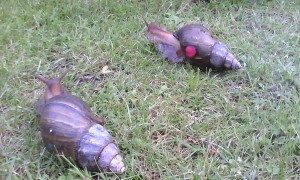Although most of us identify ourselves as poor Americans the moment try to say something, there are some words that are helpful to know.
Even us Amerikaner should learn that to ask for “eine Eiskugel, bitte,” for instance (yes, Kugel, pl. Kugeln, is a feminine word). There are so many wonderful looking icecream shops around Münster, and it is self-satisfying to be able to do more than point significantly.
Another thing: I never noticed how often we need to qualify statements when we speak. “Manchmal,” or sometimes, becomes another important word to use when talking in class or answering or questions from the Gästefamilie.
I must confess, that I never had a dog (very sad, I know) since my mother didn’t want to deal with it, and my Gästemutter is allergic to them, so instead her familie has snails! two enormous snails, around five or six inches long. And the word for snails is “die Schneke” (for the two of them, Schneken). Their names are Flitzy and Spiderman.

I babysat the snails yesterday while the girls cleaned out das Terrarium. Snails are actually quite interesting little critters. My Gästemutter thought, though, that I should refer to this activity as “beobachten,” which means to observe (in a scientific sort of way).
Präsens:
Ich beobachte
Du beobachtest
er/sie/es beobachtet
Wir beobachten
Ihr beobachtet
sie/Sie beobachten.
Perfekt
Ich habe beobachtet
du hast beobachtet
er/sie/es hat beobachtet
Wir haben beobachtet
Ihr habt beobachtet
sie/Sie haben beobachtet
There is the word gucken. The professors, host family–everyone uses this word, and for the longest while I had no idea what it meant; I couldn’t look it up in the dictionary because I thought it began with a “k.” It is a synonym of “shauen,” and LEO kindly says that it is “ugs.,” or a colloquial, slang word.
Präsens:
Ich gucke
Du guckst
Er/sie.es guckt
Wir gucken
Ihr guckt
sie/Sie gucken.
Perfekt
Ich habe geguckt
Du hast geguckt
Er/sie/es hat geguckt
Wir haben geguckt
Ihr habt geguckt
sie/Sie haben geguckt
Other words whose helpful nature is self-evident:
wahrscheinlich: probably
obwohl: although
der Quatsch (kein pl): nonsense (or blatherskites).
aus Spaß: for fun
schrullig: cranky or eccentric.

Nice Job!